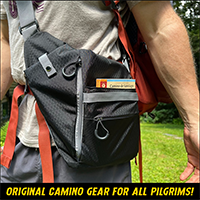I had a feeling that when I suggested that the Camino authorities take more responsibility for the intermittent bed crisis that this would evoke an effusion of Uriah Heepery from the usual suspects, and also some new ones, about my modest suggestion, which was termed "ridiculous", "unnecessary" and "thoughtless". A pilgrim is responsible for himself or herself; there is no "authority" to assist and even if there were it would be a matter of the pilgrim's personal responsibility.
It's not just that I disagree; it's that these view are categorically wrong and display a fundamental failure to understand what the Camino was and is and must always remain.
The fact is that there are authorities responsible: the local municipal and parish officials; the regional government and its tourist board; the police and Guardia Civil, and the Spanish federal government. Plus a plethora of voluntary associations, Friends of the Camino and the like. These, to be fair, recognize what many on this forum do not: that they are in fact responsible for facilitating the welfare of pilgrims and other walkers. And they do a fairly good job. Galicia provides a network of fine municipal albergues, none of which take reservations. The Guardia and police are vigilant and attentive. The tourist agencies promote the Camino effectively and distribute information. The religious and voluntary associations operate a network of donativo and parrocjial albergues which are staffed by kindly and hardworking volunteers and designed to make the Way easier for poorer pilgrims.
So they recognize that they have a responsibility, in different ways, to the pilgrims, and they discharge this fairly well, on balance. Except in making sure that sufficient bed spaces are always available and accessible, at all times, especially holidays and at chokepoints. Here they are falling down on the job, as I said, and as the OPs experience illustrates.
This responsibility to pilgrims of the civil and ecclesiastical authorities is basic to the history of the Camino. For example: the city of Estella was founded by the King of Navarre Sancho Ramírez in 1090 with a view to protecting pilgrims on St. James' Way. Estella came into existence to serve the pilgrims, and so did many other towns along the way. Serving pilgrims has been their purpose for a thousand years.
It's worth bearing in mind that many who walk the Way are elderly or afflicted, and some of them are poor. This has always been the case. People feel the impulse to go on pilgrimage for urgent spiritual and existential reasons; the authorities recognize that assisting these people is an absolute imperative. In short, they have a right to undertake pilgrimage if moved to do so and those in authority, and everyone else, has a duty to assist them. This is what the Camino was in the beginning and will always be. If you can't see that . . .























